|
|
|
Sort Order |
|
|
|
Items / Page
|
|
|
|
|
|
|
| Srl | Item |
| 1 |
ID:
129416
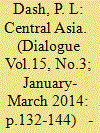

|
|
|
|
|
| Publication |
2014.
|
| Summary/Abstract |
In 2011-2012 all Central Asian countries have celebrated 20th year of their independence. They have achieved commendable progress in all spheres of their life during these years. Getting over from the monolithic ideology of communism, they have shifted to something that is not similar to any system. However, three areas are clearly discernible in the transition process of the last two decades: economy, society and ideology. The economy is no longer the command socialist economy. It is opening up, in some areas rapidly and in others slowly. Predominant private economic activities are visible in the market places. In laying the foundation of modern industry they are less visible. Foreign Direct Investment has been steadily flowing with varying degree of success in each country depending how investment savvy the FDI rules have been. The State has retained control over all spheres of economic activities. The society is no longer the communist one with free education and kindergarten, full employment guarantee to all, free housing, free medical care and many other benefits. All these have vanished. Everyone has to
fend for himself and his family. This is where it has created a schism between the haves and the have-nots thereby polarizing the society into rich and the poor. In the ideological realm, the Marxist-Leninist ideology has been completely given up. Even in academic libraries it is hard to find the works of Marx and Lenin that once adorned the shelves. Instead, works of incumbent presidents occupy the stacks. There is an irony: what the people wish to preserve, the presidents do not desire to protect.
|
|
|
|
|
|
|
|
|
|
|
|
|
|
|
|
| 2 |
ID:
132706
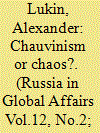

|
|
|
|
|
| Publication |
2014.
|
| Summary/Abstract |
Instead of chauvinism and chaos Russia needs a third alternative. And that is a combination of moderate patriotism and moderate liberalism manifesting itself in the commitment to freer life by law, without corruption, but with mature self-government.
|
|
|
|
|
|
|
|
|
|
|
|
|
|
|
|
| 3 |
ID:
157422
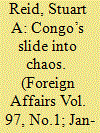

|
|
|
|
|
| Summary/Abstract |
On January 16, 2001, the Democratic Republic of the Congo tumbled into uncertainty. The country’s president, Laurent Kabila, had been sitting in his office at his marble palace in Kinshasa, the capital, when one of his teenage bodyguards entered, drew his pistol, aimed it at Kabila, and fired several times.
|
|
|
|
|
|
|
|
|
|
|
|
|
|
|
|
| 4 |
ID:
167942
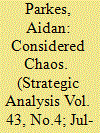

|
|
|
|
|
| Summary/Abstract |
Pakistan’s historical insecurity towards India and the Islamisation of its military raises a curious question of strategy and identity rooted in Pakistan’s political genesis. This article examines the social and geostrategic factors underpinning Pakistan’s Afghanistan approach between its inheritance of security principles from colonial administration after Partition, and the Taliban’s capture of Kabul in 1996 and beyond. This article also critically analyses the existing link between the Taliban and Pakistan’s Inter-Services Intelligence agency (ISI). Accepting the historically contingent inheritance of realist colonial security construct, this article privileges culture as a primary variable in the evolution of Pakistan’s geostrategic thought.
|
|
|
|
|
|
|
|
|
|
|
|
|
|
|
|
| 5 |
ID:
131414
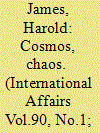

|
|
|
|
|
| Publication |
2014.
|
| Summary/Abstract |
The article explores parallels between the fragility of globalization on the eve of the First World War, in the aftermath of the financial crisis of 1907, and today's crisis of globalization following the post-2007 recession. The fragility and interconnectedness of the international economy in both cases could provide a basis for an economic-military strategy. The temptation of using economic connectedness as a substitute for conventional and costly military strategy makes this course particularly attractive to a hegemon-the UK then, the US now-that is facing powerful competition from rising powers (Germany and the US then, China now). The challengers are likely to find their own alternative strategy, and the result breeds uncertainty. In consequence, rule-based international orders are generally strained by transitions of power, even though all the parties see the desirability and need for a common system of rules
|
|
|
|
|
|
|
|
|
|
|
|
|
|
|
|
| 6 |
ID:
143238
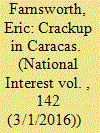

|
|
|
|
|
| Summary/Abstract |
VENEZUELA IS a failing state. Despite having the world’s largest proven hydrocarbon reserves, the nation is bankrupt. Basic consumer goods are scarce or unavailable. Purchasing power is falling fast as a result of the world’s highest inflation rate. The healthcare system is in a state of collapse. Infrastructure is in disrepair. Common crime is out of control as the social order begins to break down. The U.S. alleges leading government figures to be engaged in narcotics trafficking and money laundering.
|
|
|
|
|
|
|
|
|
|
|
|
|
|
|
|
| 7 |
ID:
096484
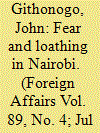

|
|
|
| 8 |
ID:
095142
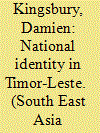

|
|
|
|
|
| Publication |
2010.
|
| Summary/Abstract |
Following a long independence struggle and international intervention, in 2006 the tiny impoverished state of Timor-Leste almost imploded in civil chaos and institutional collapse. The events of the time were quickly defined in terms of an east-west geographical and, broadly, linguistic and political divide, corresponding to pro- and anti-government groupings. International intervention quelled the worst of the violence, although elections in 2007 confirmed the general tendency, if not an absolute alignment, to the divide that had appeared in 2006. However, much also united Timor-Leste historically and culturally and, increasingly, in a broad acceptance of civic institutions. It was from this base that the small and sometimes fragile state began to build what promised to be a more coherent future.
|
|
|
|
|
|
|
|
|
|
|
|
|
|
|
|
| 9 |
ID:
121520
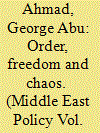

|
|
|
| 10 |
ID:
087117


|
|
|
|
|
| Publication |
2009.
|
| Summary/Abstract |
The modern state is facing challenges from numerous non-state actors, ultimately leading to the erossion of state sovereignty, authority and legitimacy. This argument has been proved appropriate in the context of Pakistani state, which is fighting a crucial battle against fundamentalist Taliban and other sectarian and extremist groups. The forces of Talibanisation are defying the Pakistani Constitution and imosing Islamic in varous parts of the country. Violence breeds more violence; this is clearly visible in Pakistan where extremist group infighting is causing significant loss of life.
|
|
|
|
|
|
|
|
|
|
|
|
|
|
|
|
| 11 |
ID:
076553
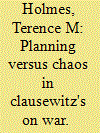

|
|
|
|
|
| Publication |
2007.
|
| Summary/Abstract |
Clausewitz laid great emphasis on the planned construction of war, but this idea has received little attention from his commentators, who generally attach far greater importance to what he said about the chaotic elements of war, in particular its interactive nature and the friction inseparable from its conduct. This article gives long-overdue recognition to planning as a dominant theme of On War. The essential point Clausewitz makes concerning interaction is not that the enemy's responses are bound to disrupt our plans, but that our plans must aim to predict and incorporate his responses. Clausewitz acknowledges that friction creates enormous difficulties for the realization of any plan, but it is precisely in respect of this challenge that he develops the concept of military genius, whose capabilities are seen above all as the executive arm of planning.
|
|
|
|
|
|
|
|
|
|
|
|
|
|
|
|
| 12 |
ID:
193295
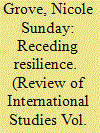

|
|
|
|
|
| Summary/Abstract |
The term disruption has been offered as both an ethos and set of practices framed as a broad response to all manner of social and political ills. This article offers a speculative reflection on disruption as a planetary mood, and the sensory qualities of a change in politics no longer defined by governance and what is governable, but by a series of continuous experiments hedged upon the creation of new geopolitical frontiers and life forms that position all matter and contingency towards a specific kind of value tied to chaos. In thinking about the kinds of authority and legitimacy being fashioned around visions of so-called disruptive futures, I draw on materially-grounded illustrations of disruptive dispositions to examine three different arrangements of affect, feeling, and intensity being animated to give disruption its power of transmissibility and adaptability, as well as its unintuitive emphasis on disorder and ‘breaking things’ as both a moral good and unconditional response to questions concerning global conflict, crises, and instability. Ultimately, disruption as a planetary mood draws on a libidinal economy that does not bend towards justice or equity, thus warning against misanthropic commitments to collapse and the consequences of investing in a world premised on an ethos of erasure.
|
|
|
|
|
|
|
|
|
|
|
|
|
|
|
|
| 13 |
ID:
095144
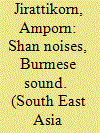

|
|
|
|
|
| Publication |
2010.
|
| Summary/Abstract |
This paper examines how ethnic Shan singers use the Burmese language to redefine their own ethnic identity, in the process helping to construct Shans' place in the Burmese national imaginary. The paper focuses on the songs of two Shan artists, Sai Htee Saing and Sai Sai Mao. These two singers have been singing in Burmese for three decades. Both have gained nationwide popularity and are now among the most famous singers in Burma's music industry. The paper consists of two parts. The first one discusses the dynamics of self-representation, examining how Shan artists select and adapt dominant discourses about them to their own task of crafting themselves. The second part investigates the audience reception of these two singers, exploring how particular groups of audience members bring their own ethnicity into interpreting a media text. Through participant observation, interviews with audiences and with the singers themselves, the author seeks to illuminate how such self-fashioning and listening practices reveal complex relations between ethnicity and the popular construction of identity.
|
|
|
|
|
|
|
|
|
|
|
|
|
|
|
|
| 14 |
ID:
165356
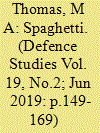

|
|
|
|
|
| Summary/Abstract |
In the mid-2000s, the United States Army was embroiled in counterinsurgency missions in Iraq and Afghanistan that required deeper understanding of local social systems. The Army turned to systems thinking and design thinking to model and understand the world, define problems, and develop approaches to strategic and operational challenges. However, the Army’s approach as expressed in publications and doctrine encourages the development of complicated, unsupported, and unfalsifiable hypotheses. The risk is that the Army will act on incorrect assumptions and develop plans that are fragile.
|
|
|
|
|
|
|
|
|
|
|
|
|
|
|
|
| 15 |
ID:
132013
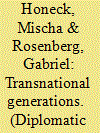

|
|
|
|
|
| Publication |
2014.
|
| Summary/Abstract |
The Cold War had just turned hot on the Korean Peninsula in late June 1950 when Deon Smith, a young Boy Scout from Mt. Vernon, Illinois, pitched his tent in Valley Forge. Fears of a global cataclysm loomed over the Revolutionary War battlefield, where nearly 50,000 Boy Scouts from the United States and twenty allied nations had gathered to celebrate Independence Day. Their jamboree marked the biggest encampment of youth on American soil to date, big enough to garner an address by President Harry Truman. "I hope that you young men … will take home from this jamboree a clearer understanding of the meaning of human brotherhood," said Truman. "I hope that you will work for freedom and peace with the same burning faith that inspired the men of George Washington's Army here at Valley Forge."1 Given the geopolitical context, the subtext was clear: "freedom and peace" required the "burning faith" of fighting men. Irony, as well as faith, burned in Truman's comments. Beyond the rhetoric of global brotherhood, Truman's internationalist overtures obscured particular national geopolitical interests on the peninsula and cast communism as an inhuman menace. Meanwhile, even as the grand statesman rallied the crowd, Deon Smith was busy forging international ties of his own-ties that did not grow out of security concerns but were driven by juvenile excitement and curiosity. He took part in various "Scoutcraft events" and "inter-camp visits," traded souvenirs with his distant peers, and formed friendships with Scouts from near and far. "Some of the most interesting groups we have met," Smith wrote, "are the Scouts from foreign lands," including boys from the former enemy nations of Germany and Japan. In this, Smith explored internationalism rather than merely assuming it. Who, then, assembled universal brotherhood more decisively at this jamboree: the president, whose speech recoded the chaos, flux, and pleasures of a sprawling encampment in the overdetermined, ironically nationalist registers of liberal internationalism, or the boy, whose handshakes gave literal flesh to Truman's rhetoric?2
|
|
|
|
|
|
|
|
|
|
|
|
|
|
|
|
| 16 |
ID:
186394
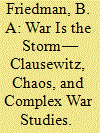

|
|
|
|
|
| Summary/Abstract |
In 1992, Ohio State University professor Alan D. Beyerchen published one of the
most important articles on Carl von Clausewitz’s theory. The article identified
aspects of chaos theory and nonlinearity in Clausewitz’s greatest work, On War.
The article’s publication triggered a spate of further articles and books examining war through the lens of chaos theory—a swirling surge of truly innovative
thought in strategic theory. However, this initial flurry did not last long, as strategic theorists became enamored first of the technophilic “revolution in military affairs” and then the post-9/11 focus on counterterrorism and counterinsurgency.
Colin S. Gray, remarking on the subject in 2002, wrote that the debate had “lost
the plot” by moving too far from a Clausewitzian concept of war, with some even
claiming that chaos theory invalidated On War.
|
|
|
|
|
|
|
|
|
|
|
|
|
|
|
|
| 17 |
ID:
086937
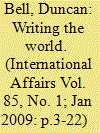

|
|
|
|
|
| Publication |
2009.
|
| Summary/Abstract |
In order to grasp some of the key intellectual developments and trends that shaped the global politics of twentieth century and continue to shape our own world-neo-classical economics, modernization theory, deterrence theory, the democratic peace, among others-it is necessary to explore the history of the human sciences. It is important, in other words, to examine the role of the modern research university in producing and diffusing ideas about the self, society, the economy and world order. International Relations (IR), and political science more generally, played a significant role in this story. In recent years we have seen a growth of interest in the history of IR, though it is still an underdeveloped area of research. Among other things, scholars have shown that many of the foundational myths of the discipline-the views that inform textbook understandings of the past and present-are deeply flawed. This article first surveys this recent work, highlighting its strengths and weaknesses, and then proceeds to offer some thoughts on future directions for research. It identifies a range of questions and topics that have yet to be adequately addressed, and draws on the latest methodological work in intellectual history, highlighting some new interpretative approaches that can enrich scholarship in this area.
|
|
|
|
|
|
|
|
|
|
|
|
|
|
|
|
|
|
|
|
|